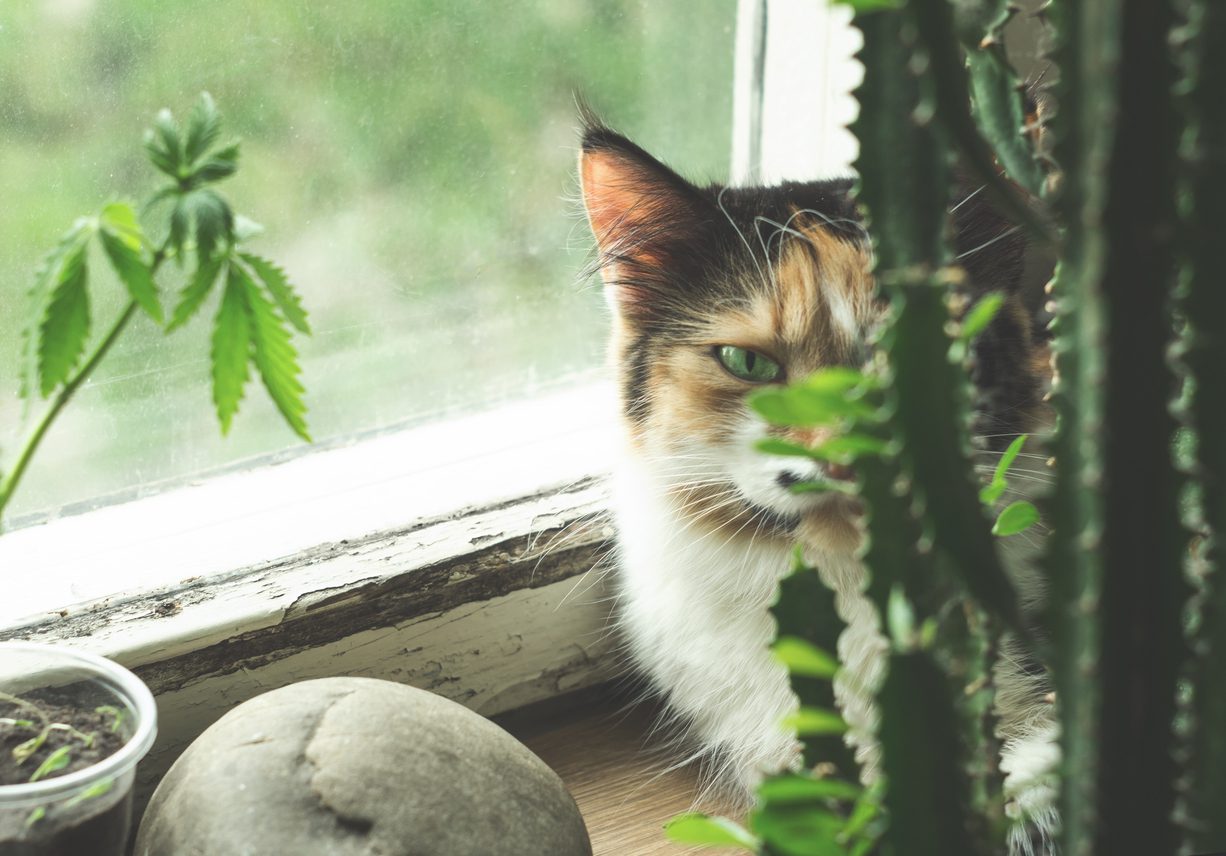As cat lovers, we all want our pets to enjoy a safe and healthy environment. Unfortunately, not everything that’s safe for humans is equally safe for cats. As cannabis and related products have become more widely available, the risk of toxic exposure among pets has increased.
With veterinarians noticing a significant increase in emergency visits due to cannabis exposure, it’s important to review some basic cannabis cautions, and to offer some suggestions to help keep your cats away from potentially dangerous substances.
What Is Cannabis?
Cannabis is a plant that has been cultivated since about 500 CE for various purposes, including the making of cloth, rope, and paper. As a medicinal herb, it has been cultivated and refined into strains that target conditions such as pain, anxiety, insomnia, and nausea.
Plants in the cannabis family all contain substances called cannabinoids, which when consumed interact with receptors throughout the human body. Tetrahydrocannabinol (THC) is the cannabinoid most often associated with the mood-altering effects of cannabis, but it is only one of many compounds within the plant.
Now let’s take a look at why cannabis is dangerous to cats.
Cannabis Toxicity in Cats
Cats’ bodies work somewhat differently than our own. That means that they can’t safely process some of the chemical compounds we consume. Some substances, for example, cannot be easily processed and excreted, and these can linger in the system, building to toxic levels.
According to the Michigan State University’s College of Veterinary Medicine, common symptoms of cannabis toxicity in cats may include:
- Excessive sleepiness or excitation
- Drooling
- Dilated pupils
- Low blood pressure
- Vomiting
In more severe cases, your pet may experience heart arrhythmias such as bradycardia (a slow rhythm), seizures, or even death.
Treatment for Cannabis Overdose in Pets
If you suspect that your pet has consumed cannabis or is experiencing a toxic exposure to cannabis products, contact your veterinarian immediately. While the vast majority of cannabis exposures in cats are non-lethal, you’ll still want to get your pet checked out.
Let your vet know the substance, potency, and amount of cannabis you believe your cat to have consumed. Cats are small, making them sensitive to toxic exposure, so it’s important to seek care quickly. For immediate assistance, you may also contact the ASPCA’s animal poison control center toll free at (888) 426-4435.
Most cannabis exposures in cats do not require hospitalization, however your vet may choose to keep your animal overnight for observation or further treatment.
Preventing Toxic Exposures to Pets
So how do cannabis exposures occur and how can we prevent them? The increase in legal cannabis products, as well as in the variety of consumables has vastly increased the health risks to pets.
Edible products (such as candies, chocolates, pills, and gummies) can seem like yummy treats to a curious feline. The majority of exposures reported to vets can be traced to the increased popularity of edibles. The THC and other cannabinoids in natural cannabis flower must be heated to confer their effects, making it difficult for a catnip-mixup to result in a toxic overdose.
Additional prevention tips:
- Label any cannabis products that may be confused with catnip.
- Don’t let curious cats nibble on buds or other parts of the cannabis plant.
- Keep any homemade cannabis edibles (“pot brownies”) away from pets.
- Keep cannabis edibles, capsules, or other consumables stored in a place that’s safe from curious kitties. (See stylish jar below.)

A Note on Catnip
Catnip is a plant in the mint family and does not contain the same compounds found in cannabis products. Catnip offers your feline a safe way to relax, get playful, or just zone out, without the risk for toxic exposure or overdose.
Conclusion
Responsible pet ownership means keeping potentially toxic substances away from your furry companions. Cannabis contains compounds called cannabinoids that cats’ bodies cannot process effectively. We encourage you to label and store all cannabis products away from curious paws, and to report any accidental exposures immediately to your veterinarian.
